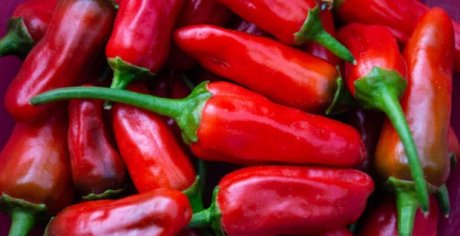All About Piri-Piri Peppers
Peri-peri, often hyphenated or as one word, and with variant spellings piri-piri, piripiri or pili pili) is a cultivar of Capsicum frutescens from the malagueta pepper. It was originally produced by Portuguese explorers in Portugal's former Southern African territories, particularly Mozambique and its border regions with South Africa, and then spread to other Portuguese domains.
Pilipili in Swahili means "pepper". Other romanizations include pili pili in the Democratic Republic of the Congo and peri peri in Malawi, deriving from various pronunciations of the word in different parts of Bantu-speaking Africa. Peri peri is also the spelling used as a loanword in some African Portuguese-language countries, especially in the Mozambican community. The peri-peri spelling is common in English, for example in reference to African-style chili sauce, but in Portuguese it is nearly always spelled piri-piri.
The Oxford Dictionary of English records peri-peri as a foreign word meaning "a very hot sauce made with red chilli peppers", and gives its ultimate origin as the word for "pepper" (presumably in the native-African sense) in the Ronga language of southern Mozambique, where Portuguese explorers developed the homonymous cultivar from malagueta pepper.
Dried piri piri chilis
Plants are usually very bushy and grow in height to 45–120 cm (18–47 in) with leaves 4–7 cm (1+1⁄2–3 in) long and 1.3–1.5 cm (1⁄2–9⁄16 in) wide. The fruits are generally tapered to a blunt point and measure up to 2–3 cm (3⁄4–1+1⁄4 in) long. Immature pod colour is green, mature colour is bright red or purple. Some Bird's eye chili varieties measure up to 175,000 Scoville heat units.
Cultivation
Like all chili peppers, piri piri is descended from plants from the Americas, but it has grown in the wild in Africa for centuries and is now cultivated commercially in Zambia, Uganda, Malawi, Zimbabwe,[7] and Rwanda. It grows mainly in Malawi, Zambia, South Africa, Ghana, Nigeria, Zimbabwe, Mozambique and Portugal. It is cultivated for both commercial food processing and the pharmaceutical industry. Cultivation of piri piri is labor-intensive.
Piri piri sauce
Originally produced by Portuguese in Southern Africa (there is still a debate whether Portuguese initially produced it either in Angola or Mozambique), the sauce is made from peri-peri chilis (used as a seasoning or marinade). Beyond Portugal and the Southern African region (Angola, Namibia, Mozambique and South Africa) where it was born, the sauce is particularly famous in the United Kingdom due to the success of the South African restaurant chain, Nando’s.
Recipes vary from region to region, and sometimes within the same region depending on intended use (example, cooking vs. seasoning at the table) but the key ingredients are chili and garlic, with an oily or acidic base.
Other common ingredients are salt, spirits, citrus peel, onion, pepper, bay leaves, paprika, pimiento, basil, oregano and tarragon.
Photo Credit: pepperscale.com
You might also like:
Comments


